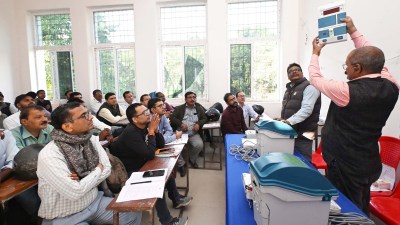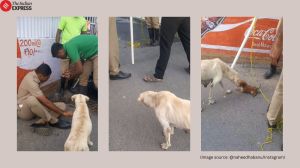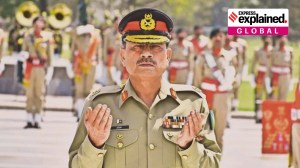Music stop
At Alandi,shops selling musical instruments wait for touring musicians to start their yatra from this Maharashtra village.
Dyaneshwar Netke usually opens his shop after 9.30 a.m. But last Thursday,Netke and his four helpers at Gyan Sagar Pakhawaj Makers turned up even before the clock struck eight,all set to attend to their visitors who come twice a year.
The village of Alandi,located on the banks of Indrayani river in Pune district,is dotted with small shops selling and repairing musical instruments. Of the eight musical instrument shops in Alandi,five are on Pradakshina Road. The shopkeepers wait eagerly for palkhi,a 1,000-year-old Maharashtrian tradition during which three lakh warkaris,devotees of Sant Dnyaneshwar Maharaj,visit Alandi to begin their ten-day long religious yatra to Pandharpur. The warkaris play musical instruments and sing and dance during the procession,chanting Ramkrishna Hari Vithal Keshava and covering the 240 km to Pandharpur in a span of 18 days.
Most of the devotees reach Alandi a day or two before the palkhi. Each group travels in huge trucks,carrying everything they require for their big journey. It is considered auspicious to serve warkaris. We have more than 200 dharamshalas here,which are well-equipped to serve them. Few of the warkaris prefer staying in the tents,as they carry foodgrains,oil,stove,clothes and everything that they might need for the next few days, says Sudhir Gandhi,chief manager,Shree Dyaneshwar Maharaj Sansthan Committee. A palkhi is divided into several groups called dindis and every dindi has at least one veena player,six mrudang or pakhavaj player and hundreds of taalvadaks.
Our usual earnings are between Rs 8,000 and Rs 10,000 a month but during palkhi,we earn five to six times that money. Since 80 per cent of our customers come to us to repair their old instruments,we need to have enough people who are proficient in repairing the pakhavaj,veena and taal, says Netke,owner of one of the oldest musical instrument shops in Alandi. Namdeo Teur,of Shree Sagar Pakhavaj Makers,says the warkaris usually dont buy new instruments during the June palkhi since most of them are farmers and would have invested all their money into sowing the new crop. They buy new instruments during the November palkhi,when they visit Alandi after selling their crops, says Teur.
Most of the customers visit Alandi a month in advance and leave their instruments with the shopkeeper for the repair work. And when they re-visit Alandi for the palkhi,they reclaim their instruments. I have customers coming from all over the state, says Mahadev Teur of Kala Sagar Pakhavaj Makers.
Each shop has at least 5-6 workers who are skilled in fixing all kinds of musical instruments. The workload increases so much that we open our shop at 7.30 in the morning and shut only by 10.30 p.m, says Abhimanyu Shivsagar of Shree Ganesh Pakhavaj Makers.
Walking out of Kalasagar Pakhavaj Makers after giving his pakhavaj and taal for a maintenance check,Vaijnath Shinde says,I have been using this pakhavaj for the last 15 years. Every year,I get it repaired as a new one would cost me between Rs 1,500 and Rs 5,000. Shindes dindi has 500 people,six of whom play the mrudanga.
Ramkrishna Maharaj of village Narse in Nanded district has decided to buy a pakhavaj. After much bargaining and intense scrutiny of the instrument for a good half-an-hour,Maharaj buys it for Rs 1,600. He heads a group from Nanded that has more than 200 devotees.
We bought our last pakhavaj in 2007. Our group has four mrudangacharyas,40 taalkaris and one veenakari. Next year,we plan to buy a new veena too, says Maharaj,who is attending the palkhi for the seventh time.



- 01
- 02
- 03
- 04
- 05



























